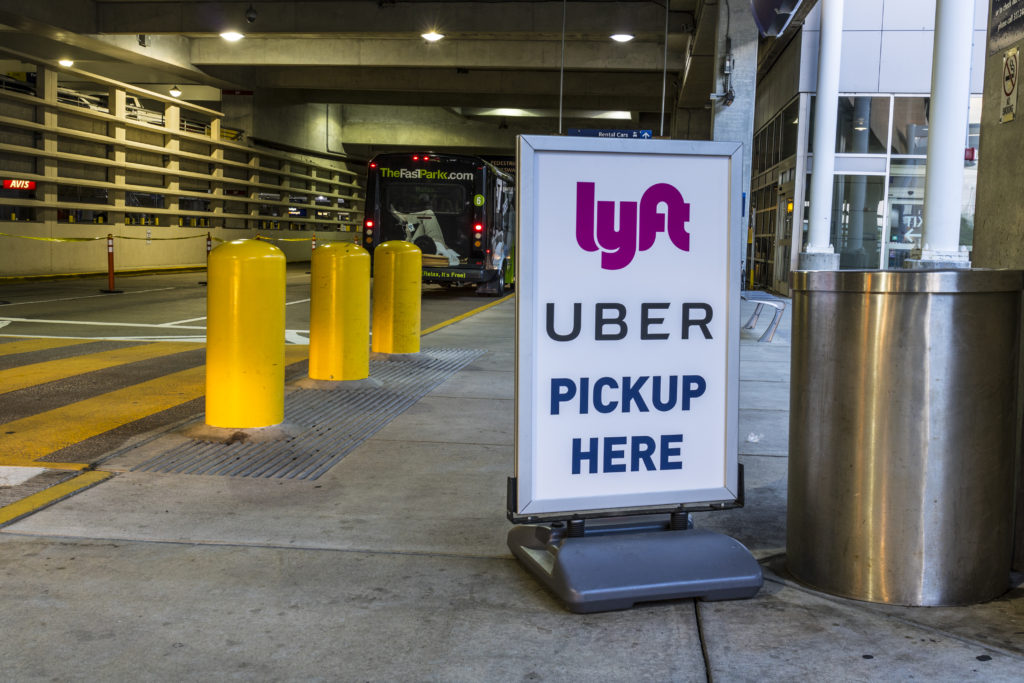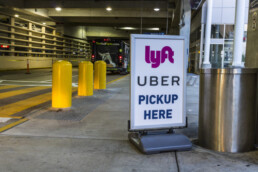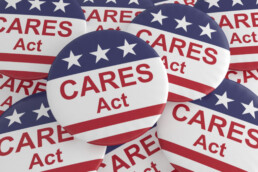Big Win in PA Court Case May Have Big Impact
A recent Pennsylvania Supreme Court decision may be a big win for all drivers who work for ride-hailing companies like Uber and Lyft. On July 27, 2020, the highest court in Pennsylvania held that a part-time Uber driver was not “self-employed,” The designation is significant because Uber has consistently argued in lawsuits across the country that drivers are independent contractors and self-employed, not employees.
By categorizing the estimated 2.6 million Uber drivers in the U.S. as being self-employed, Uber is not required to provide any federal or state benefits. In this case, however, the sole issue was whether his part-time work with Uber disqualified him from unemployment benefits because an applicant who engages in an independent business venture is not eligible for unemployment benefits. While the decision is not binding on other states, it could be a significant victory for all ride-hailing drivers as well as gig workers more broadly.

The case in Pennsylvania involves a laid-off behavioral specialist who started working for Uber part-time. The driver, however, was denied unemployment benefits because his part-time work with Uber was categorized as an “independent business venture.” The court, however, ruled that the driver was not self-employed because Uber had “significant control” over his work, and therefore eligible for unemployment benefits due to losing his full-time job as a behavioral specialist. The court acknowledged that drivers do have some autonomy such as setting work hours and rejecting rides, but overall, the court found that there were more significant aspects of the contract that Uber controlled. For example, Uber sets the rate for services, drivers cannot establish work relationships with passengers, and drivers cannot subcontract their work.
While the decision is good news for drivers, the court stopped short of saying the decision should be applied broadly because “individual decisions must be made in specific cases based upon the unique facts presented in each circumstance.” Similarly, the court did not hold that the driver was an “employee” of Uber, which is the question at the core of lawsuits across the country.
Currently, under federal and state laws, independent contractors are generally not eligible for certain employee benefits such as overtime pay, meal/rest breaks, and paid sick time. While that question remains unsettled, litigation is pending in California and around the world and millions of drivers wait anxiously for a favorable decision that would provide them with the benefits and protection they deserve under federal and state law.
FREE CONSULTATION
Srourian Law Firm, with locations in Los Angeles, Westwood, Woodland Hills, and Orange County is experienced in all aspects of employment law including the representation of ride-hailing drivers and have aggressively represented employees in Los Angeles, Hollywood, Santa Monica, Orange, Irvine, Anaheim, Santa Ana, Newport Beach, Costa Mesa, Fullerton, Tustin, Mission Viejo, San Clemente, Garden Grove, Laguna Niguel, Brea, Fountain Valley, Aliso Viejo, Yorba Linda, Westminster, Laguna Hills, Cypress, and La Habra.
If you or someone you know suffered employment violations as a ride-hailing driver, you may have certain employee rights under state and federal law, and may be entitled to compensation as a part of the class action lawsuit. Please contact us to speak with one of our lawyers for a free consultation.
Federal Government Clarifies CARES Act Eligibility

As the country continues to struggle with the challenges due to COVID-19, labor laws have been adapting to the pandemic, and employees must be aware of their rights. One area that has been significantly impacted by COVID-19 is the laws regarding unemployment benefits. The federal and state laws that govern unemployment benefits have always been complicated, and are especially difficult to understand now with the Coronavirus Aid, Relief, and Economic Security Act (CARES) that was enacted in March 2020. CARES expanded weekly unemployment benefits by as much as $600 a week to eligible workers and have proven to be vital to many families during the pandemic. While there have been a myriad of issues and concerns regarding CARES, there is no denying that to many unemployed workers relied on the additional funds as the nation’s unemployment rate sky-rocketed. Moreover, many states were overwhelmed with the volume of applications, and benefits were delayed.
While it is uncertain whether the CARES Act will be extended, the federal government provided some clarification on July 22, 2020. For example, a worker may refuse to accept a job offer because the job is unsafe and continue to collect the additional financial benefits provided under CARES. The states, however, will determine what is considered to be safe work conditions, and if a state determines the job or work conditions are not “suitable,” then the worker may receive the expanded unemployment benefits under CARES. Most states already had suitable work place provisions in place prior to COVID-19, and the general criteria is whether the work unreasonably exposes the worker to unsuitable safety risks. Labor laws have always guaranteed a safe work environment, which is particularly important during a pandemic. Notably, a worker cannot refuse a job offer and seek expanded unemployment benefits due to a general fear of COVID-19.
According to the U.S. Department of Labor, the state may also determine that a job is unsuitable if a worker refuses the job due to virus-related reasons such as increased risk of COVID-19 due to an underlying medical condition. The state may also determine a job is unsuitable if a worker claims “good cause,” although the federal government has not specifically defined what is considered to be “good cause” which means that states must decide that issue. Fortunately, workers in California benefit from some of the country’s strongest state labor law protections, and this is one example of how an experienced labor law attorney will be able to argue your case by understanding state laws to protect your rights when federal law is not clear.
The federal government also clarified that some out-of-work employees are not eligible for CARES benefits depending on what caused the loss of the job. For example, if a worker is unemployed due to a reason not related to COVID-19, that worker is not eligible for expanded benefits even if jobs are not available due to COVID-19 related circumstances. The reason for this is because CARES was enacted to assist workers who faced unemployment specifically due to the pandemic, and is not broad enough to include workers who did not lose their jobs due to reasons unrelated to COVID-19. Fortunately, those workers may still be eligible for regular unemployment benefits.
Prior to COVID-19, workers who quit their jobs without “good cause” were generally not eligible for unemployment benefits. However, under the CARES Act, certain reasons related to COVID-19 would allow a worker to qualify for expanded unemployment benefits under CARES. For example, a worker who quits a job because of mandatory quarantine, or the need to provide care to a family member with COVID-19 could be considered “good cause” for the purposes of CARES benefits.
While the federal government continues to debate whether to extend benefits under the CARES Act or perhaps craft new legislation, the states may decide to adopt new policies regarding eligibility in the meantime. However, since unemployment benefits are a hybrid of federal and state law, the states must adhere to federal law and provide at least the minimum benefits afforded under federal laws. Also, as more states work towards re-opening and more businesses are hiring, states may become stricter in determining eligibility for unemployment benefits. As we have learned, during a pandemic, it is important to be informed and be ready to take full advantage of any benefits you are eligible for. Plan ahead and consult an experienced labor law attorney so you will have an advocate that will not only understand the quickly changing laws and benefits, but will be able to guide you and protect your rights during these uncertain times.
FREE CONSULTATION
Srourian Law Firm, with locations in Los Angeles, Westwood, Woodland Hills, and Orange County is experienced in all aspects of employment law including unemployment benefits and have aggressively represented employees in Los Angeles, Hollywood, Santa Monica, Orange, Irvine, Anaheim, Santa Ana, Newport Beach, Costa Mesa, Fullerton, Tustin, Mission Viejo, San Clemente, Garden Grove, Laguna Niguel, Brea, Fountain Valley, Aliso Viejo, Yorba Linda, Westminster, Laguna Hills, Cypress, and La Habra.
If you or someone you know suffered employment violations involving unemployment benefits, you may have certain employee rights under state and federal law, and may be entitled to compensation as a part of the class action lawsuit. Please contact us to speak with one of our lawyers for a free consultation.
FAQs on Whistleblowers
Reporting your company or supervisor for violating the law can be frightening. However, reporting workplace violations are important to ensure the rights of all employees, and in some cases protect the health and safety of employees, the public and the environment. Fortunately, federal and state laws protect employees who report violations.
Q: What is a whistleblower?
The term “whistleblower” is used to describe an employee who reports an employer for violating the law. The violation could be an illegal act taken by the employer against the whistleblower, or a general violation with a wider impact. For example, an employee who reports an incident of sexual harassment at work would be a whistleblower. Similarly, an employee who reports an employer for violating pollution laws would also be a whistleblower.
Q: Are whistleblowers protected?
Yes. There are many federal and state laws enacted specifically to protect whistleblowers. In addition to protection from retaliation, whistleblowers can also file a lawsuit against the employer if there is retaliation for reporting the violation of the law. In other words, an employee cannot retaliate (or punish) an employee for being a whistleblower.
Federal law protection for whistleblowers require a “good-faith” belief that a violation of the law occurred. Like many legal terms, it is difficult to define “good-faith,” but courts have generally held that a good-faith belief be a combination of the whistleblower’s subjective opinion as well as an objective basis for the violation. An experienced labor law attorney can discuss the facts of your case and advise you on how to proceed with an allegation against your employer and ensure that your rights are protected under Federal law.
Whistleblowers are also protected under state law, and California labor laws provide significant protection to employees, and are considered among the strongest in the country. For example, under the California Labor Code, an employer cannot retaliate against a whistleblower if the employee “reasonably” believes a violation has occurred which is considered a lower burden than the federal law requiring a good faith belief. Moreover, the California whistleblower is protected even if the employer is cleared of any wrong-doing.

Q: What is considered whistleblower retaliation?
A: Whistleblower retaliation includes a variety of actions such as:
• wrongful termination;
• demotion;
• failure to promote when promotion is merited;
• denying opportunity for training or professional development;
• blacklisting;
• reducing pay or hours;
• reassignment to less desirable task;
• intimidation;
• denying access to resources necessary to perform work duties; and
• making any threat including a threat to report non-citizen employee to ICE or immigration.
Under California law, an employee is protected from workplace retaliation even if the employee did not actually make a whistleblowing report. In other words, employers cannot retaliate against an employee because they believe the employee is a whistleblower.
Q: What can I do if my employer retaliates against me for being a whistleblower?
A: If you believe you are the victim of unlawful labor practices, or that your employer is violating the law or regulations, you have the right to file a complaint without fear of retaliation. For example, if you are the victim of sexual harassment, you have the legal right to file a formal complaint against your employer through the regular channels proscribed in the employee handbook or your employment contract. Similarly, if the wrongful action by your employer is a workplace safety violation or an environmental violation, you have the right to file a complaint to an appropriate governmental agency such as OSHA (Occupational Safety and Health Administration) or the EPA (Environmental Protection Agency) and not fear retaliation.
After reporting the violation, an investigation should be conducted, and your rights as a whistleblower protect you from workplace retaliation. However, if your employer does retaliate, you can file a lawsuit against your employer for whistleblower retaliation. If you prevail, you may be entitled to compensation for lost wages and benefits, physical pain, mental suffering, loss of career opportunities, punitive damages, legal costs and attorney’s fees.
There are strict deadlines on retaliation claims, so be sure to act promptly after the retaliation and speak to an experienced labor law attorney to ensure your rights are protected.
FREE CONSULTATION
Srourian Law Firm, with locations in Los Angeles, Westwood, Woodland Hills, and Orange County is experienced in all aspects of employment law including whistleblower retaliation, and have aggressively represented employees in Los Angeles, Hollywood, Santa Monica, Orange, Irvine, Anaheim, Santa Ana, Newport Beach, Costa Mesa, Fullerton, Tustin, Mission Viejo, San Clemente, Garden Grove, Laguna Niguel, Brea, Fountain Valley, Aliso Viejo, Yorba Linda, Westminster, Laguna Hills, Cypress, and La Habra.
If you or someone you know suffered employment violations due to whistleblower retliation, you may have certain employee rights under state and federal law, and may be entitled to compensation as a part of the class action lawsuit. Please contact us to speak with one of our lawyers for a free consultation.
Know the Law. Know your Rights.

What is OSHA?
“OSHA” is the Occupational Safety and Health Administration, which enforces the Occupational Safety and Health Act of 1970 (OSH Act). The Act, enacted by Congress, ensures safe and healthful working conditions for employees. OSHA provides protection to almost all private sector and some public sector employees by establishing and enforcing strict standards.
What is the Occupational Safety and Health Act of 1970?
“OSH Act” is a set of laws that enforces the workplace conditions that employers must comply with and includes regulations that ensure the health and safety of employees. In general, that means that the workplace must be free of hazards that can cause injuries or illnesses. For example, OSH Act protects employees from being exposed to toxic chemicals, unsanitary work conditions, extremely loud noises and physical hazards that could result in slips and falls.
In addition to specific standards tailored to a particular industry (i.e. construction), all employers must comply with the General Duty Clause which requires the workplace to be “free of serious recognized hazards that are likely to cause death or serious physical injury to his employees.”
The Act also requires employers to provide employees with personal protective equipment (PPE) as well as attempt to eliminate or reduce hazards to minimize risks. However, any serious hazard must be eliminated. A “serious hazard” is defined by OSH Act as one “that there is a substantial probability that death or serious physical harm could result.”
How does OSH Act ensure workplace safety?
The Act requires employers identify hazards and keep records of workplace injuries. Moreover, employers must investigate workplace injuries, illnesses and incidents. Employers are required to use this data to identify hazards and implement practices to reduce the risks with corrective actions.
In addition, OSHA investigates workplace complaints as well as conducts random inspections. Employers also have the right to file a confidential safety and health complaint requesting an OSHA inspection if the employee believes there is a hazard.
What happens if OSHA finds a workplace violation?
OSH Act has strict penalties for employers who “willfully or repeatedly” violate the Act. Civil penalties can range from $5,000 to $70,000 for each willful violation. Employers can also be fined for failing to correct hazardous conditions. In the most serious cases of OSH Act violations, OSHA can seek a court order to force the employer to eliminate any “imminent danger” and the immediate removal of all employees from the workplace.
Does OSH Act conflict with California State Law?
The Division of Occupational Safety and Health (DOSH or Cal/OSHA) provides state protection to employers that often provides greater protection than the federal OSH Act. In fact, California boasts some of the country’s most strict protections for employees under state law. If you are an employee working in California, you should file a complaint with the state agency in most cases. However, there are some cases that must be filed with OSHA. An experienced labor law attorney can provide you with the appropriate agency based on the facts of your case.
Can an employee sue an employer for OSHA violations?
Yes. If an OSHA violation resulted in an injury, you can sue your employer for failing to adhere to OSHA. You may also sue any negligent or legally liable party which could include the property owner, a general contract or a third party. Also, depending on your injury and the OSHA violation, you could be part of a class action if other employees are similarly injured.
Also, your rights as an employee could be violated in other ways such as being fired for filing an OSHA complaint, or for refusing to work in unsafe conditions. In fact, there are over 20 labor laws that protect whistleblowers and prohibit employers from retaliating against an employee who complains. There are strict time limits for filing these claims for whistleblower protection, so be sure to consult an experienced labor law attorney immediately after a retaliatory action occurs.
FREE CONSULTATION
Srourian Law Firm, with locations in Los Angeles, Westwood, Woodland Hills, and Orange County is experienced in all aspects of employment law including OSHA and Cal/OSHA violations and have aggressively represented employees in Los Angeles, Hollywood, Santa Monica, Orange, Irvine, Anaheim, Santa Ana, Newport Beach, Costa Mesa, Fullerton, Tustin, Mission Viejo, San Clemente, Garden Grove, Laguna Niguel, Brea, Fountain Valley, Aliso Viejo, Yorba Linda, Westminster, Laguna Hills, Cypress, and La Habra.
If you or someone you know suffered employment violations as an employee due to hazards in the workplace, you have certain employee rights under state and federal law, and may be entitled to compensation as a part of the class action lawsuit. Please contact us to speak with one of our lawyers for a free consultation.
FAQs on Arbitration

Often a job offer will include an employment contract that you are expected to sign. Understandably, as a prospective employee, you are anxious to be hired, so you may not give much thought to signing the contract. However, every employment contract will be unique, and you must be sure that the terms in the contract reflect the negotiations that lead to the job offer. More importantly, you need to make sure the contract is fair and your rights are protected by consulting with an experienced labor law attorney.
Q: What is arbitration?
A: Arbitration is a type of alternative dispute resolution that handles disputes without going to court. The dispute is decided by one or more neutral arbitrators after the parties present evidence and make arguments in an arbitration hearing. Some hearings also permit questioning witnesses. The rules of arbitration are less formal than a trial, but there are federal and state rules of arbitration that must be followed. Arbitration can be either binding or non-binding. In binding arbitration, the arbitrator’s decision may include an award for damages which is enforceable by law. In non-binding arbitration, the decision is merely “advisory” in nature, and the parties can either accept the decision, or pursue binding arbitration or a trial.
Q: What is an arbitration clause?
A: An arbitration clause is often included in agreements including employment contracts. The primary purpose of an arbitration clause is to require any dispute between the parties pursuant to the contract be settled by arbitration. In other words, if an employee alleges the employer has violated terms of the employment contract, the employee must resolve the dispute through arbitration instead of going to court. The arbitration clause, however, may designate arbitration as either “mandatory” or “voluntary.” Mandatory arbitration requires arbitration, while voluntary arbitration means the parties may chose arbitration by mutual agreement. Most employment contracts include a mandatory arbitration clause because employers generally prefer arbitration. Arbitration clauses can be complicated, and include many terms regarding venue, costs, procedures, scope of disputes, and selection of arbitrators. You should consult with an experienced labor law attorney before signing any arbitration clause to ensure your rights are protected. More importantly, your attorney can identify any unfair terms of the arbitration clause, and employment contract in general, and request modification.
Q: Should I sign an employment contract with an arbitration clause?
A: Whether you agree to an arbitration clause or not will depend on many factors, and you should consult with an experienced labor law attorney before signing any employment contract. You should realize that arbitration clauses, and employment contracts in general, are often written to favor the employer. With that said, your attorney can review the terms of the contract and advocate for your rights. Just as not all employment contracts are the same, arbitration clauses will differ as well. If you are asked to sign an employment contract, be sure to consult with an experienced labor law attorney, despite your eagerness to accept employment. You must protect your rights as an employee and take every step possible to ensure the terms of your employment are fair before signing an employment contract.
Q: Why do employers include arbitration clauses in employment contracts?
A: There are several reasons why employers prefer arbitration rather than a trial. First, arbitration is usually less expensive than a trial. Second, arbitration is considered a private resolution of a dispute between parties, and therefore would not be as public as a trial. Also, an unfavorable ruling against an employer would not be setting precedence for other employees, unlike case law. Third, many arbitration clauses in employment contracts prohibit employees from joining a class action lawsuit. Class action lawsuits are important to challenge wide-spread labor law violations, and employers discourage class actions which could result in significant legal fees, financial liability as well as bad publicity. Finally, because there is an inherent imbalance of bargaining power at the time of hiring, many employers use this advantage by including arbitration clauses that deprives employees of their rights to their day in court. This also provides an on-going advantage to the employer who knows that the employee is restricted by the arbitration clause.
FREE CONSULTATION
Srourian Law Firm, with locations in Los Angeles, Westwood, Woodland Hills, and Orange County is experienced in all aspects of employment law including employment contracts and arbitration clauses, and have aggressively represented employees in Los Angeles, Hollywood, Santa Monica, Orange, Irvine, Anaheim, Santa Ana, Newport Beach, Costa Mesa, Fullerton, Tustin, Mission Viejo, San Clemente, Garden Grove, Laguna Niguel, Brea, Fountain Valley, Aliso Viejo, Yorba Linda, Westminster, Laguna Hills, Cypress, and La Habra.
If you or someone you know suffered employment violations due to an unfair employment contract or arbitration clause, you may have certain employee rights under state and federal law, and may be entitled to compensation as a part of the class action lawsuit. Please contact us to speak with one of our lawyers for a free consultation.





